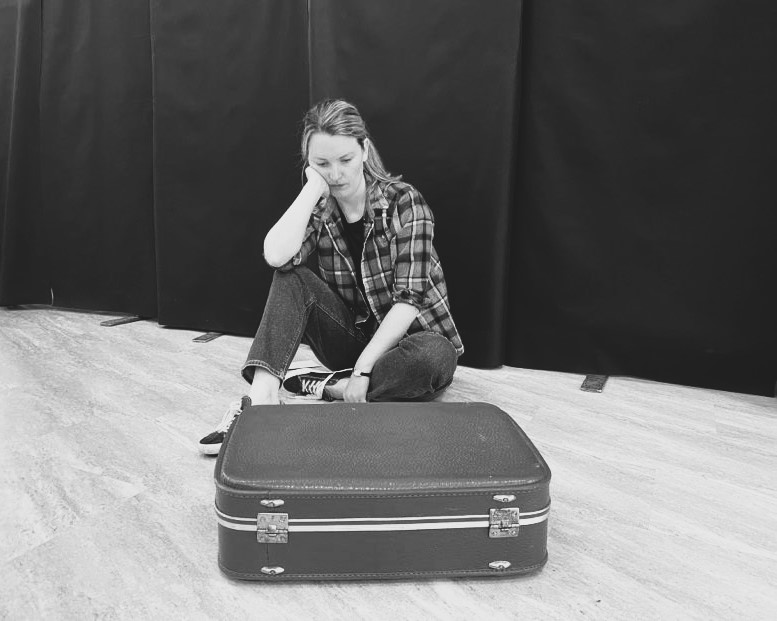Alex Boese and Michael Catlin Talk ‘Birthmarks’

Recently, I had a chance to sit down with performer Alex Boese and director Michael Catlin to chat about their upcoming play Birthmarks, which will be playing at Kingston Fringe. The play was written by Canadian playwright Alexandria Haber and follows Alex’s character, Kate. Birthmarks follows Kate as she tries to get over a tragic loss in her life while also trying to reconcile the relationship with her mother whom she has not seen since she was a child. This one-woman play follows Kate through these inner conflicts and we get to know this complicated character within the 40 minute runtime.
This interview has been edited for length and clarity.
I want to start off with—just tell me about yourselves, how you two got into directing, Michael, and acting, Alex. I feel like a lot of people, when they get into this sort of profession, it’s very different routes.
Alex: Well, I started doing plays when I was about three years old, and I’ve just really always loved it. I feel lucky that I found what I like to do at a really young age. So I did a lot of community theatre. I’m a teacher and I did a teachable in drama at school… When I was ten I saw The Blonde Brunette and Vengeful Redhead at [the Stratford Festival]. It really kind of inspired me to one day do a one woman show.
Michael: I did a show in grade seven and eight. And I really enjoyed that, it’s high. Once you get all your lines down, and you perform it, and then they applaud—it’s nice… When I was in my late 20s I moved back to Kingston. And I’ve always gone to [Domino Theatre] when I was growing up and so I went and auditioned and got a part in a play. And I’ve been doing it now, off and on, for 40 years.
So this show is called Birthmarks. And it’s a one woman play. What made you want to pursue this sort of play? Did the script speak to you? Did you relate to it?
Alex: Yeah, I actually found the script and I asked Michael to direct it. I really love the script. I think it’s a really powerful story about somebody who’s gone through a pretty tragic loss… I think I liked the powerful emotional component of it. I liked how there’s a bit of mystery. And the character of Kate, she’s so interesting. She’s such a fun challenge to play because she’s got these big swings of emotions, like she’ll start to really open up and say something really personal. And then she’ll break it up and tell a joke or something. So it’s fun to play those really big swings.
Michael: I must say that when I read [the script] the first time, it was like “ehhh I don’t know.” I didn’t really say much to you. And then the next day or so I read it again. And then I read it again. And the more I read it, the more I was like “Whoa—a really good script.” It has so many parallels in it between what she’s going through and what happened earlier in [Kate’s] life.
In your own words, can you touch on what the play is about and what the audience could expect going into the performance?
Michael: [Kate] has been in a psychiatric hospital and she’s getting out of the hospital that day. She just got a letter from her mother and she hadn’t heard from her mother in 10 or 15 years. She also suffered a big loss in her life. So all those things come together… You could just tell the story is written in chronological order but the way the playwright says it, it’s intriguing, and it’s just near the end that you hear the whole thing all come together.
Alex, when creating this character were there any challenges in creating Kate. Did it come naturally to you? Or did you need to approach this character in a particular way?
Alex: I think in some ways, it was natural, because there are some ways that Kate and I are similar. She’s going through some things where she’s really rethinking some of her choices. But I think, overall, Kate is different from me, especially with her physicalities and habits. So that’s something as an actor I’ve tried to really be mindful of.
For the both of you, what sort of challenges are there in acting as one person and directing one person compared to an ensemble?
Michael: In some ways, it seems easier, because you’re only dealing with one actor to direct. But I’m always aware that we have to make this play interesting for the audience. And how do you do that with just one person? With two or three people there’s conflict, so you can draw the audience in. And in this, there’s no real conflict really. There is inner conflict. I remember how it affected me at one point thinking about this. It’s kind of like stand up comedy. In my mind, it’s like retelling the story to the audience. So in that way, it’s like stand-up because a comedian comes up and tells stories. And so that’s how I’ve approached it.
Alex: Yeah, and I feel in some ways it’s more challenging than doing a show with other cast members because, one, memorization. When you’re acting with other people, their lines cue you and kind of jog your memory for your next line and for a one person show, it’s just my lines cuing me. And another thing is, when you act with other people, you sort of feed off their energy which helps the show, so with a one woman show it’s challenging that all the energy comes from me engaging with the audience.
This seems like a profession where you’re always learning—this is your first one-person performance. In this process of rehearsing and creating this sort of play, is there anything you have learned that sticks out to you?
Michael: It’s really given me more time to hone the play. It’s a short play. So I mean, literally, we could open it tomorrow night. There’s more work to do. But I think we could do a show tomorrow night.
Alex: I think something that Michael said earlier is a big “aha” moment, which is keeping it interesting when it’s only one person. It’s definitely been a learning process for me. And having variety in movement and tone and speed of voice and things like that, to keep the audience engaged.
Did you two add your own personal touches to the script?
Michael: I want to talk to [Haber] and ask her questions because we don’t know if [Kate] finished high school. We don’t know whether she went to university, we don’t know if she ever had a job. We are just going by what the lines are and figuring it out.
Well I guess it sort of gives you more of a creative touch on it. You get to make your own backstory of the character, which I assume, as an actress, that’s interesting, too.
Alex: That’s the fun in doing [a show] we haven’t seen either, right. You can add your own touch on it. I have tried to figure a lot out about her and do research.
When I leave a performance, I always think, what did I learn? How do I feel basically, not really has this changed my life? But, how did this change my perspective on certain situations? Is there anything that you want the audience to walk out feeling or learning?
Alex: I think the show is a tragedy. But I think we’re trying to portray it in a way that there’s some hope for moving on after a significant loss and trauma. I think something that I took away from the script was a message or moral of you don’t really know someone until you’ve heard their story or walked in their shoes. I think there’s a bit of compassion and understanding of other people’s perspectives in this show.
That’s awesome. I am really looking forward to seeing this. Is there anything else you two would like to add?
Alex: I didn’t mention that we have quite a strong production team as well. We’ve got Kevin Tanner as our lighting designer, James Hrkach is our set designer, Michael Gourgon is our sound designer, and we have two stage managers working on the show; Remira Pryce and Linda Hamstra. I mean, it’s a one person show from an acting point. But there is a really collaborative team effort happening behind it too.
Well I really look forward to seeing it.
Michael: It’s a brilliant show. I just love this script. It just tells this story in a really unusual way.
‘Birthmarks’ will be performing eight times at the Kingston Fringe Festival between August 4th and August 13th at the Kingston Grand Theatre, Baby Grand Theatre.
This article was edited on December 1st, 2023 to update formatting.
